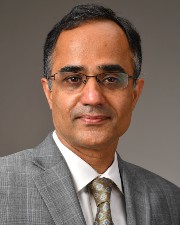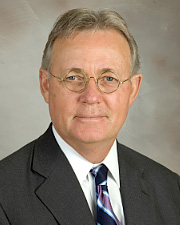Neurosurgery Residency Program
Dear Prospective Residents:
The Residency Program at the Vivian L. Smith Department of Neurosurgery at McGovern Medical School is driven by outstanding and dedicated faculty, a dominant clinical program with extensive numbers of complex neurosurgical cases, and a substantive research program geared towards developing new treatments and devices for patients in the near future.
We are committed to providing the best neurosurgical care to the citizens of Houston, to leading the world in advancing the art and science of neurosurgery, and to producing the next generation of neurosurgical leaders. All aspects of this mission are integrated into our daily practice. Clinicians collaborate with scientists, and all are involved in teaching.
Each faculty and staff member in the Department is committed to the goal of being the best and training the best. Residents are individually mentored, evaluated, and promoted, and are also regularly asked to evaluate the Program and participate in its continual improvement. Through this structure, our residents develop into excellent neurosurgeons, positioned to become leaders in any area of their career interest.
UTHealth神经科学是把酒店的领导者ovations to the field of neuroscience, with a long list of firsts in the treatment of stroke, multiple sclerosis, epilepsy, neurotrauma, brain aneurysms, and other complex neurological conditions. We are proud of the dedication of our team of physicians and scientists and invite you to learn more about our Residency Program.
Sincerely,
 |
 |
|
| Nitin Tandon, M.D. CHAIR ad interim |
Arthur Day, M.D. CO-CHAIR, DIRECTOR OF EDUCATION & PROGRAM DIRECTOR |
Residency Applicants
Application to the McGovern Medical School at UTHealth Vivian L. Smith Neurosurgery Residency Program is done strictly through theElectronic Residency Application System(ERAS) using theNational Residency Match Program(NRMP).
Medical students can apply to our program starting September 15th(refer to NRMP for official date). Applications are reviewed on a continuous basis. Invitations for interviews will go out beginning in mid-October.
RESIDENCY MATCH TIMELINE:
2021 – 2022
面试的季节
- Applications Accepted: Sept. 15, 2021
- Rank Order List Deadline: March 2, 2022
- Match Day: March 18, 2022
In general, our interview process consists of two, half-day segments – on a Monday and Tuesday. The first day begins at 1:30 p.m. with an overview of the department and residency program by Nitin Tandon, M.D., Chair ad interim, and Arthur L. Day, M.D., Program Director. The afternoon will continue with a tour of our facilities and the campus. Interviews with the faculty will begin shortly after. That evening you will have the opportunity to casually interact with our current residents during dinner at a local restaurant.
The second day will begin at 7:00 a.m., and you will have the opportunity to attend our regularly scheduled morning conference.
Interviews with the faculty will continue shortly after the conclusion of morning conference and will conclude by 11:30 a.m. Lunch will be provided afterwards from 11:30 a.m.–12:30 p.m. You are encouraged to attend lunch, but we understand that you may have to leave following interviews because of travel obligations. Therefore, attendance at lunch is not mandatory.
Please note that interview sessions begin at 1:30 p.m. on the first day and will end by 12:30 p.m. on the second day.
Because of SARS-CoV-2 (COVID-19), the interview process process will be dependent on the university’s guidelines for in-person meetings and travel. If any or all of the interviews move to a virtual setting, our residency program coordinator will give you further interview details.
Per NRMP guidelines, Final Match decisions are submitted by the Residency Program in mid-February. Match Day – when the new incoming residents are identified – is in mid-March!
A Look at Our Program
At McGovern Medical School at UTHealth, our aim is to be the best — locally, nationally and internationally. Each faculty and staff member in the department of Neurosurgery has complete commitment to the goal of being the best and training the best. Residents are individually mentored, evaluated and promoted, and are also regularly asked to evaluate the Program and participate in its continual improvement. Through this structure, McGovern Medical School residents develop into excellent and academically oriented neurosurgeons, positioned to learn throughout their careers.
UTHealth Neurosciences is very proud of our neurosurgery residency program. Get to know what makes our program special from those who know it best – our amazing residents:
Also, watch this video to get an insight into the facilities where our residents train:
Faculty
The McGovern Medical School Residency Program is comprised of faculty in all segments of neurosurgery, including endovascular neurosurgery and Gamma Knife.
We also have faculty involved in critical care and neurology. This offers a complete resident education in all segments of neurosurgery cases, in and out of the OR.
Case Volume
In affiliation with Mischer Neuroscience Institute, the UTHealth Neurosciences Program offers one of the largest neurosurgical caseloads in the United States, with more than 4,000 surgical cases per year. This permits a significant resident operative experience, beginning at the PGY-2 level. Residents at all levels typically operate four days a week, with one day spent in a subspecialty clinic specific to the rotation.
Single Institution
All residency training is completed at Memorial Hermann-Texas Medical Center and Memorial Hermann Southwest. This allows for all residents to work together on a daily basis to maintain the entire neurosurgical patient population, and gives them minimal call requirements.
Technology
McGovern Medical School is at the cutting edge of technology, with physicians and staff continuously discovering and implementing new treatments and diagnostic tools. Advances used regularly in our Program include state-of-the-art intraoperative robotics, neuro-endovascular labs, interoperative CT, Gamma Knife® and computer-assisted surgery including navigation and neuroendoscopy.